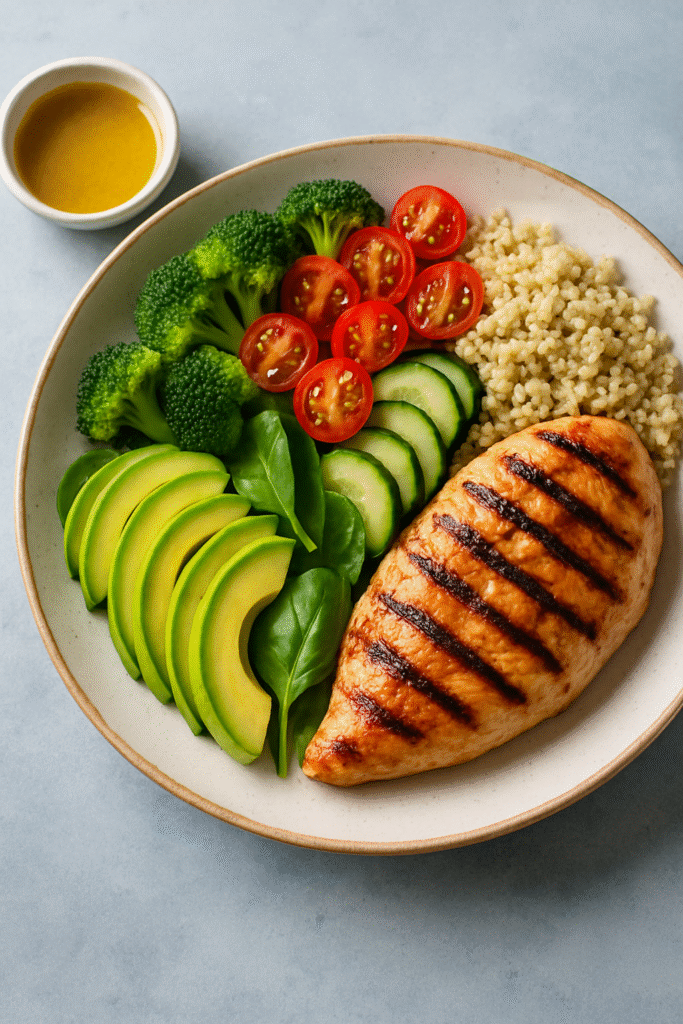In today’s fast-paced world, maintaining a healthy diet is more important than ever. A balanced diet not only provides the essential nutrients your body needs to function properly but also plays a significant role in preventing various health issues such as obesity, heart disease, and diabetes. Whether you’re looking to lose weight, boost energy, or simply maintain good health, understanding the components of a healthy diet can make a world of difference.
What is a Balanced Diet?
A balanced diet consists of a variety of foods that provide essential nutrients your body needs to stay healthy. These nutrients include carbohydrates, proteins, fats, vitamins, minerals, and water. By ensuring your diet includes a mix of all these components, you can support optimal physical and mental well-being.
The Key Components of a Healthy Diet
- Carbohydrates
Carbohydrates are the body’s main source of energy. They can be found in foods like bread, rice, pasta, fruits, and vegetables. It’s essential to focus on complex carbohydrates, such as whole grains, which provide fiber and take longer to digest, helping to maintain energy levels throughout the day. Simple carbs, like those found in sugary foods and drinks, should be consumed in moderation as they can lead to spikes in blood sugar. - Proteins
Proteins are essential for the growth, repair, and maintenance of body tissues, including muscles, skin, and organs. High-quality protein sources include lean meats, poultry, fish, beans, nuts, and legumes. For vegetarians or vegans, plant-based proteins like tofu, quinoa, and lentils are excellent alternatives. It’s important to choose lean protein sources to avoid excess saturated fats. - Healthy Fats
Not all fats are created equal. While saturated and trans fats should be limited, healthy fats are crucial for heart health and brain function. Sources of healthy fats include avocados, olive oil, nuts, seeds, and fatty fish like salmon. These fats also help your body absorb fat-soluble vitamins such as A, D, E, and K. - Fruits and Vegetables
Fruits and vegetables are packed with vitamins, minerals, fiber, and antioxidants, which are essential for a healthy immune system and overall well-being. They also help to reduce the risk of chronic diseases. Aim to fill half of your plate with fruits and vegetables at each meal, and try to eat a variety of colors to ensure you’re getting a wide range of nutrients. - Vitamins and Minerals
Vitamins and minerals play vital roles in various bodily functions, including energy production, immune system support, and bone health. You can obtain these nutrients through a diverse diet rich in fruits, vegetables, dairy products, whole grains, and lean meats. In some cases, supplements may be needed, but it’s always best to get most of your vitamins and minerals from food. - Water
Water is essential for life and is involved in nearly every bodily function, from digestion to temperature regulation. Aim to drink at least eight glasses (64 ounces) of water a day, more if you’re physically active. Staying hydrated helps improve concentration, maintain energy levels, and support healthy skin.
Portion Control: Eating in Moderation
While eating the right foods is important, portion control is equally crucial for maintaining a balanced diet. Even healthy foods can contribute to weight gain if consumed in excessive amounts. One way to manage portions is by using smaller plates, which can help prevent overeating. Another method is paying attention to hunger and fullness cues, allowing your body to guide how much food you need.
A great approach to portion control is the “plate method.” Divide your plate into three sections:
- Half of the plate should be filled with fruits and vegetables.
- A quarter of the plate should be filled with lean proteins.
- The remaining quarter should be filled with whole grains or starchy vegetables.
This simple method helps ensure you are eating a balanced meal while keeping portions in check.
The Role of Diet in Weight Management
A balanced diet plays a significant role in maintaining a healthy weight. Consuming nutrient-dense foods helps keep you satisfied for longer, reducing the chances of overeating. Additionally, a well-balanced diet provides the energy you need for physical activity, which is essential for weight management.
If your goal is weight loss, it’s important to focus on creating a calorie deficit, meaning you consume fewer calories than your body uses. However, it’s essential to approach weight loss in a healthy and sustainable manner. Extreme calorie restrictions or fad diets can lead to nutritional deficiencies and may not provide lasting results.
Tips for Creating a Healthy Meal Plan
- Plan Your Meals
Planning your meals ahead of time can help ensure you have access to healthy options throughout the week. Meal planning can reduce the likelihood of turning to unhealthy fast food or snacks when you’re hungry. - Cook at Home
Cooking at home gives you full control over the ingredients you use, making it easier to stick to a healthy diet. It also allows you to experiment with new, nutritious recipes. - Snack Wisely
Healthy snacks can help curb hunger between meals. Opt for snacks that are rich in protein and fiber, such as a handful of nuts, yogurt with berries, or carrot sticks with hummus. - Mind Your Beverages
What you drink is just as important as what you eat. Choose water, herbal teas, or unsweetened beverages over sugary drinks like soda and juices. Alcohol should also be consumed in moderation, as it can be high in empty calories. - Stay Active
Diet and exercise go hand in hand. Regular physical activity helps regulate appetite, boost metabolism, and support overall health. Aim for at least 150 minutes of moderate aerobic activity or 75 minutes of vigorous activity per week.
Conclusion
A balanced diet is the cornerstone of good health. By prioritizing nutrient-dense foods, practicing portion control, and staying hydrated, you can support your body’s needs and enhance your quality of life. Remember that healthy eating is not about perfection, but about making consistent, mindful choices that benefit your overall well-being.
Start small by incorporating more fruits and vegetables into your meals, swapping processed snacks for healthier alternatives, and staying active. With time, you’ll begin to notice improvements in your energy levels, mood, and overall health.


